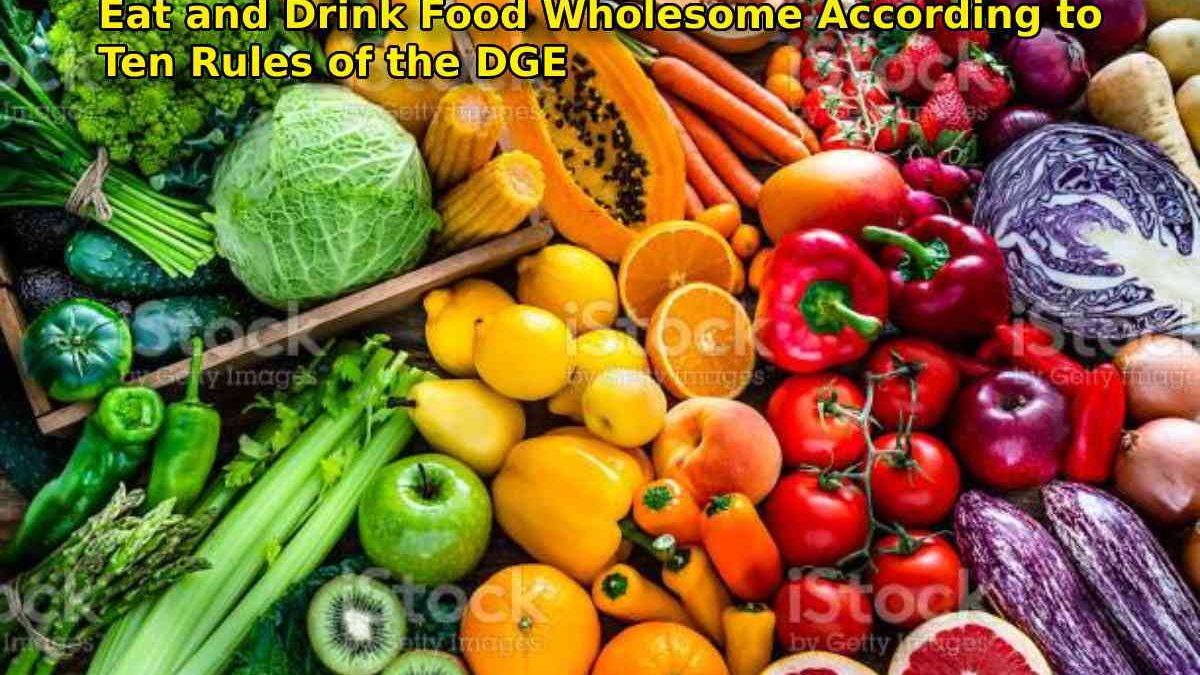Eat and Drink Food- wholesome eat and drink foods keeps you healthy and promotes performance and well-being. Based on current scientific findings, the German Nutrition Society has formulated how this can be implemented in 10 rules.
Table of Contents
Enjoy Food Variety
Use the variety of foods and eat a variety of foods. Choose generally plant-based foods
No single food contains all the nutrients. The more wide-ranging you eat, the lower the risk of an unbalanced diet.

Make an exciting selection from all food groups. This will be easy for us to eat and drink whole foods.
Plant-based foods such as vegetables, fruit, grains, and potatoes provide many nutrients, fiber, and phytochemicals while consuming few calories.
Although vegetable oils and nuts are high in calories, they are also valuable sources of nutrients.
To facilitate an adequate supply of nutrients, it makes sense to supplement plant foods with animal foods such as milk, dairy products, fish, meat, and eggs.
Vegetables and Fruits – Take “5 a day.”
Enjoy at least three servings of vegetables and two servings of fruit daily. The colorful selection also includes peas such as lentils, chickpeas, beans, and (unsalted) nuts.
Vegetables and fruit provide plenty of nutrients, fiber, and secondary plant substances and contribute to satiety. In addition, eating vegetables and fruits lowers the risk of cardiovascular and other diseases.
Vegetables and fruit are an essential food group in terms of quantity in a wholesome diet and bring a lot of color and variety to the menu. In addition, the different ingredients’ types and interactions make up the positive health effects of vegetables and fruit.
At least 400 g of vegetables (approx. three portions) and 250 g of fruit (approx. two portions) daily are recommended.
One portion of dried legumes such as beans, lentils, or chickpeas corresponds to approx. 70 g raw or 125 g cooked.
Nuts, oilseeds, or dried fruit can replace one serving of fruit a day. However, the serving size is smaller because the calorie content is higher: a serving of nuts, oil seeds, or dried fruit is equivalent to 25 g.
Choose Whole Grain to Eat and Drink Food
The whole grain variety is the best choice for your health regarding grain products like bread, pasta, rice, and flour.
Whole grain foods fill you up longer and contain more nutrients than white flour products. In addition, dietary fiber from whole grains reduces the risk of type 2 diabetes mellitus, dyslipidemia, colon cancer, and cardiovascular disease.
Grain products are a significant part of a wholesome diet. They provide carbohydrates and plenty of fiber, extra vitamins, and minerals as a whole grain variant.
Starches are a significant source of energy for humans. Whole grain products are filling and have many health benefits.
The DGE recommends consuming at least 30 g of dietary fiber from whole grain products, vegetables, legumes, and fruit daily.
In adding to whole grain cereal products, potatoes are also possible sources of carbohydrates. Prepared as boiled, jacket, or baked potatoes, they are a good choice that contains few calories.
Supplement the Range with Eat and Drink Food of Animal Origin
milk and dairy products like yogurt and cheese daily. Eating meat means no more than 300-600 g per week.
Milk and dairy products provide protein, vitamin B 2 , and calcium readily available. Sea fish provides you with iodine and oily fish with valuable omega-3 fatty acids. Meat contains readily available iron as well as selenium and zinc. However, meat and especially sausage, also contain unfavorable ingredients.
Only foods of animal origin contain available vitamin B 12 in appreciable amounts. Therefore, anyone who eats little or no animal food must ensure that they take vitamin B 12 in addition.
Eat and Drink Food Milk and Dairy Products Daily
Yogurt, buttermilk, kefir, quark, or cheese are a few examples of products made from milk. Milk and milk products are offered in such a variety that daily enjoyment is straightforward.
Regular consumption of milk and dairy products supports bone health and is also associated with a reduced risk of colon cancer. Current findings also suggest that the daily consumption of one serving of fermented milk products (approx. 150 g/day) such as yogurt, kefir, or buttermilk could reduce the risk of type 2 diabetes mellitus.
Eat Fish Once or Twice a Week
Oily fish is significant for cardiovascular health and reduces the risk of stroke.
- Fatty fish like salmon, mackerel, and herring contain long-chain omega-3 fatty acids (DHA and EPA). In addition, native freshwater fish such as trout and carp are suitable suppliers of these fatty acids.
- Saltwater fish such as cod or redfish also contain iodine. As a component of the thyroid hormones, iodine fulfills vital tasks.
Rarely Eat Meat and Sausages
A small amount of meat can help provide essential nutrients as part of a wholesome diet. A weekly amount of meat and sausages ranging from 300 g for adults with a low-calorie requirement to 600 g for adults with a high-calorie condition is sufficient.
For classification: A portion of meat can weigh 100 to 150 g. A slice of cold cuts, ham, or aspic, can weigh between 15 and 25 g.
When it comes to meat, the distinction between red and white meat is also essential.
- Red meat is beef, pork, lamb, sheep, and goat meat.
- White meat is the meat of poultry such as chicken.
Those who eat a lot of red meat and sausage have a higher risk of colon cancer. Though, according to the present state of knowledge, there is no relationship between white meat and cancer.
Occasionally Eggs
Eggs are a good source of high biological value protein and a range of essential nutrients (e.g., fat-soluble vitamins). At the same time, the yolk is rich in fat and cholesterol. Therefore, eating too many eggs was consider critical for a long time. However, recent studies examining the relationship between the number of eggs eaten and the risks of various diseases show conflicting results. Accordingly, no upper limit for the consumption of eggs can currently be derived. However, an unlimited amount is not recommended as a plant-based diet.
Eggs can complement your diet and form part of a wholesome diet – but plan your consumption wisely.
Conclusion:
Our bodies and brains are powered by the food and drink we consume, and the amount of energy, nutrients, and water we receive from these sources can have impact on how we feel about ourselves, how we process the information around us, and how we emotionally respond to different situations.

